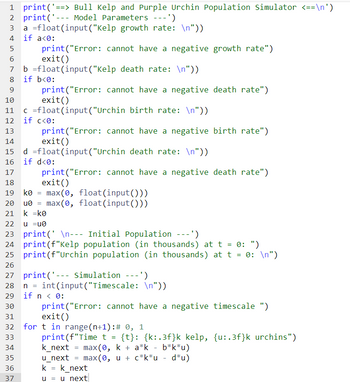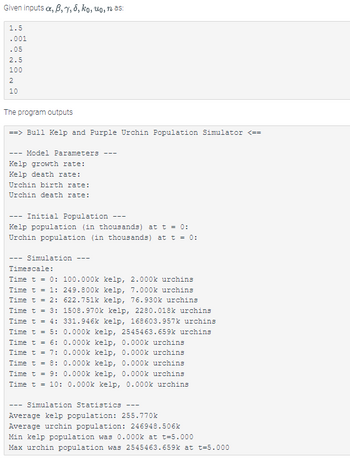
Database System Concepts
7th Edition
ISBN: 9780078022159
Author: Abraham Silberschatz Professor, Henry F. Korth, S. Sudarshan
Publisher: McGraw-Hill Education
expand_more
expand_more
format_list_bulleted
Concept explainers
Question
I need help using this python code for this question

Transcribed Image Text:1 print('==> Bull Kelp and Purple Urchin Population Simulator <==\n')
2 print('- Model Parameters ---')
a float(input ("Kelp growth rate: \n"))
if a<0:
print("Error: cannot have a negative growth rate")
exit()
b =float(input("Kelp death rate: \n"))
8 if b<0:
9
10
11 c =float
12 if c<0:
13
14
4
5
6
16
17
18
19 ko
29
30
31
print("Error: cannot have a negative death rate")
exit()
ko = max(0, float(input()))
20 u0= max(0, float(input()))
21
k =k0
33
34
35
22
u =u0
23 print( \n--- Initial Population ---')
24 print (f"Kelp population (in thousands) at t = 0: ")
25 print (f"Urchin population (in thousands) at t = 0: \n")
26
27 print('--- Simulation ---')
m m m
print("Error:
exit()
36
(input("Urchin birth rate: \n"))
print("Error: cannot have a negative birth rate")
exit()
d =float (input ("Urchin death rate: \n"))
if d<0:
37
cannot have a negative death rate")
n = int(input("Timescale: \n"))
if n < 0:
print("Error: cannot have a negative timescale ")
exit()
for t in range (n+1): # 0, 1
print (f"Time t = {t}: {k:.3f}k kelp, {u:.3f}k urchins")
k_next = max(0, k + a*k - b*k*u)
u_next
max (0, u + c*k*u - d*u)
k = k_next
u = u next

Transcribed Image Text:Given inputs a, 6, 7, 8, ko, uo, nas:
1.5
.001
.05
2.5
100
2
10
The program outputs
==> Bull Kelp and Purple Urchin Population Simulator <==
- Model Parameters
Kelp growth rate:
Kelp death rate:
Urchin birth rate:
Urchin death rate:
Initial Population
Kelp population (in thousands) at t = 0:
Urchin population (in thousands) at t = 0:
- Simulation ---
Timescale:
Time t = 0: 100.000k kelp, 2.000k urchins
Time t = 1: 249.800k kelp, 7.000k urchins
Time t = 2:
Time t = 3:
Time t = 4:
Time t = 5:
---
622.751k kelp, 76.930k urchins
1508.970k kelp, 2280.018k urchins
331.946k kelp, 168603.957k urchins
0.000k kelp, 2545463.659k urchins
0.000k kelp, 0.000k urchins
Time t = 6:
Time t = 7:
0.000k kelp, 0.000k urchins
Time t = 8:
0.000k kelp, 0.000k urchins
Time t = 9: 0.000k kelp, 0.000k urchins
Time t = 10: 0.000k kelp, 0.000k urchins
---
Simulation Statistics
Average kelp population: 255.770k
Average urchin population: 246948.506k
---
Min kelp population was 0.000k at t=5.000
Max urchin population was 2545463.659k at t-5.000
Expert Solution
arrow_forward
Step 1
Refer below the corrected code and it's output:
Trending nowThis is a popular solution!
Step by stepSolved in 3 steps with 1 images

Knowledge Booster
Learn more about
Need a deep-dive on the concept behind this application? Look no further. Learn more about this topic, computer-science and related others by exploring similar questions and additional content below.Similar questions
- please help me by giving me a few ideas (do not write the code for me please) for a python code that includes all the following: Strings Int and Floats ,Inputs,Definitions, Conditionals ,Match Statements & Modulo ,Loops ,Lists and Dictionaries ,Error Handling ,Libraries ,Testingarrow_forwardAbout beginner python programming: - Imagine that you want to send a congratulations message and would like to repeat those congratulations many timestimes in the message. Something like “Happy Birthday!! Happy Birthday!! Happy Birthday!! ..." until fullyour friend's screen. You can write once and copy and paste. Then you notice, there in the middleof the way, that you typed wrong...Ouch! Now that you know how to use Python to make it work for you,do a function that receives as input a text and the desired number of repetitions and returns astring composed of n repetitions of this text. - so I know how to input a specific word in python and multiply it by a number but not how to input a string as a variable (which can be any word, text, expression) and multiply it.arrow_forward
Recommended textbooks for you
 Database System ConceptsComputer ScienceISBN:9780078022159Author:Abraham Silberschatz Professor, Henry F. Korth, S. SudarshanPublisher:McGraw-Hill Education
Database System ConceptsComputer ScienceISBN:9780078022159Author:Abraham Silberschatz Professor, Henry F. Korth, S. SudarshanPublisher:McGraw-Hill Education Starting Out with Python (4th Edition)Computer ScienceISBN:9780134444321Author:Tony GaddisPublisher:PEARSON
Starting Out with Python (4th Edition)Computer ScienceISBN:9780134444321Author:Tony GaddisPublisher:PEARSON Digital Fundamentals (11th Edition)Computer ScienceISBN:9780132737968Author:Thomas L. FloydPublisher:PEARSON
Digital Fundamentals (11th Edition)Computer ScienceISBN:9780132737968Author:Thomas L. FloydPublisher:PEARSON C How to Program (8th Edition)Computer ScienceISBN:9780133976892Author:Paul J. Deitel, Harvey DeitelPublisher:PEARSON
C How to Program (8th Edition)Computer ScienceISBN:9780133976892Author:Paul J. Deitel, Harvey DeitelPublisher:PEARSON Database Systems: Design, Implementation, & Manag...Computer ScienceISBN:9781337627900Author:Carlos Coronel, Steven MorrisPublisher:Cengage Learning
Database Systems: Design, Implementation, & Manag...Computer ScienceISBN:9781337627900Author:Carlos Coronel, Steven MorrisPublisher:Cengage Learning Programmable Logic ControllersComputer ScienceISBN:9780073373843Author:Frank D. PetruzellaPublisher:McGraw-Hill Education
Programmable Logic ControllersComputer ScienceISBN:9780073373843Author:Frank D. PetruzellaPublisher:McGraw-Hill Education

Database System Concepts
Computer Science
ISBN:9780078022159
Author:Abraham Silberschatz Professor, Henry F. Korth, S. Sudarshan
Publisher:McGraw-Hill Education

Starting Out with Python (4th Edition)
Computer Science
ISBN:9780134444321
Author:Tony Gaddis
Publisher:PEARSON

Digital Fundamentals (11th Edition)
Computer Science
ISBN:9780132737968
Author:Thomas L. Floyd
Publisher:PEARSON

C How to Program (8th Edition)
Computer Science
ISBN:9780133976892
Author:Paul J. Deitel, Harvey Deitel
Publisher:PEARSON

Database Systems: Design, Implementation, & Manag...
Computer Science
ISBN:9781337627900
Author:Carlos Coronel, Steven Morris
Publisher:Cengage Learning

Programmable Logic Controllers
Computer Science
ISBN:9780073373843
Author:Frank D. Petruzella
Publisher:McGraw-Hill Education